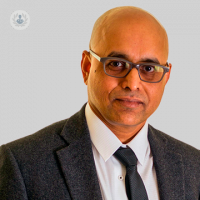Are all brain tumours life-threatening?
Written in association with:Thankfully, not all brain tumours require treatment, and can go almost unnoticed throughout an individual’s lifespan. There are, though, other tumours in the brain that can lead to serious life-threatening complications.
In our latest article, Mr Venkat Iyer, a highly respected and qualified neurosurgeon and spinal surgeon, tells us how brain tumours are detected, and what happens when either a small or more severe brain tumour is diagnosed.

How exactly are brain tumours detected?
Diagnosis is directed by clinical suspicion, by looking at the symptoms, and seeing whether or not it’s pointing towards a particular pathology. The mainstay of diagnosis is typically an MRI scan of the patent’s brain.
When is surgery required to treat brain tumours?
Small meningiomas, in most people, never require surgery nor any form of treatment really. However, tumours within the substance of the brain, or tumours that are pressing on the brain, will require an operation when symptoms start to show.
An operation is also required when the tumour becomes very big and there is a potential for it to start growing fast.
How life-threatening can brain tumours potentially be?
They can be quite life-threatening, but it really depends on where it is, the symptoms the tumour is causing, and how fast we think it’s growing.
What is the next step in the process once a brain tumour has been diagnosed?
If someone has been diagnosed with a brain tumour that has just been picked up on a scan, and that is showing no symptoms, then we would perform a repeat scan after a month or so to see if the tumour is growing, and at what speed it's growing. If, however, we suspect a potentially fast-growing brain tumour, then we would consider a biopsy or we would try to remove as much of the tumour as possible.
The aim of surgery would be to try to control the tumour, but to also make sure that the patient has a good quality of life. We don’t want to perform many operations that would likely give the patient a substantial deficit in some way.
Book a consultation with Mr Venkat Iyer today via his Top Doctors profile if you are worried about the potential presence of a brain tumour.



